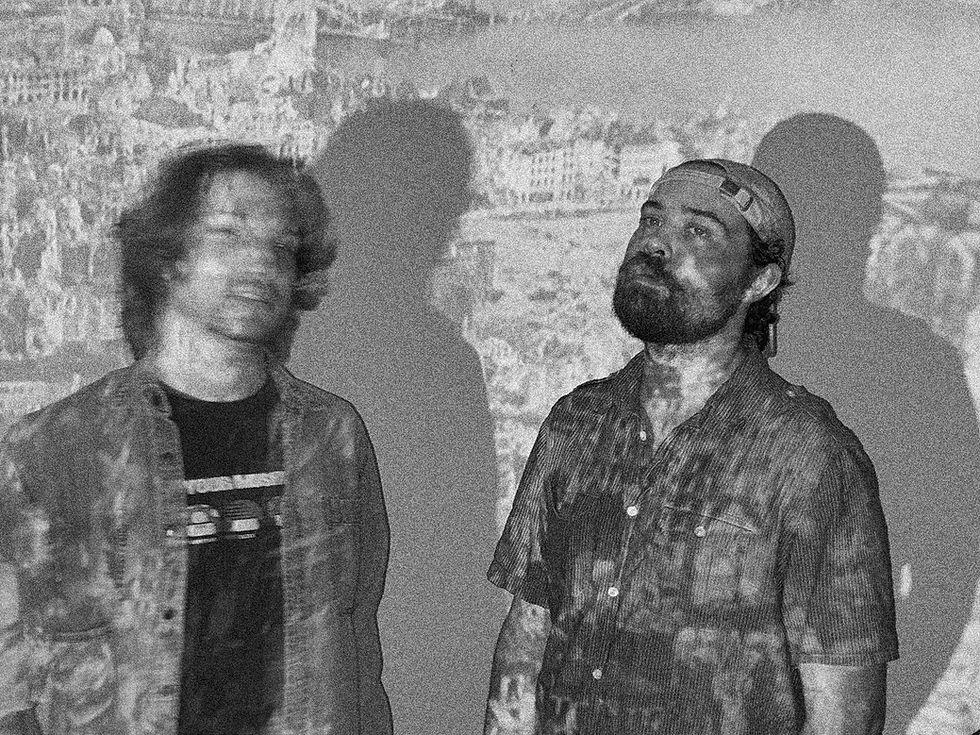Passing Phrase Breaks the Signal on “Waterbound”
- Jennifer Gurton

- Aug 19, 2025
- 3 min read

Passing Phrase doesn't just play with sound. They bury it, warp it, and let it resurface covered in tape hiss and emotional weight. Their latest single, "Waterbound," is a study in texture, a lo-fi soundscape that feels more like a memory than a song.
The Los Angeles-based trio consists of Alex Opazo, D.W. Strickler, and OkKen. Two-thirds of the group come from the underground punk band Torched Eyes, and while this new project dials down the aggression, it still carries that same raw spirit. "Waterbound" strips away polish and leaves you with something bruised, intimate, and hypnotic.
The track opens with a low hum, like a machine trying to come back to life. Soon, fragments of guitar start to creep in, fragile and barely formed. Percussion is subtle and off-kilter, drifting in and out like the tide. There is no clear hook or chorus. Instead, "Waterbound" lets itself breathe, pulling you slowly into its strange orbit.
What makes Passing Phrase stand out is its use of real instruments and obsolete recording gear. The tape hiss is not an aesthetic filter. It's the sound of their process. You can hear the imperfections, the wobbles, the clicks. These aren't mistakes. They are part of the language.
This isn't music for the background. It demands stillness and attention. The more you listen, the more you notice the way certain tones bend slightly out of tune, or how melodies vanish and reappear like ghost signals. It's meditative but uneasy. Beautiful, but frayed around the edges.
"Waterbound" feels like finding a dusty cassette in an attic that somehow knows exactly how you feel. It's lo-fi, but full of depth. Quiet, but never passive. For fans of experimental noise, down-tempo meditations, or just the sound of something real, this track is a quiet triumph.
What was the original spark behind "Waterbound," and how did it take shape creatively?
Alex: I just wanted to make something dark and electronic that brought out a certain unhinged vibe.
Dylan: We originally discussed creating an atmospheric vibe. We also wanted to make the listening experience feel as if you're listening to an old Walkman.
Why do you choose to work with analog gear and obsolete equipment in an age of digital ease?
Alex: I think for a lot of people, doing things digitally is easier, but for me, this was the easiest approach. I'm no master producer by any means.
Dylan: There is a unique sound with analog gear and obsolete equipment. It's these little imperfections and sounds that create an identity that is authentic and non-artificial.
How do you view the relationship between imperfection and emotion in your music?
Alex: I think for all music, the imperfections are what make it unique to the person making it. It comes through in ours.
Dylan: Imperfections in this track come from improvisation. For example, certain tape noise would come through on certain deliveries of vocal lines that helped create emphasis to the plea of the lyrics. This came from experimenting in the recording process.
How has your background in punk influenced your current experimental approach?
Alex: Punk music definitely helped me with the idea of not caring what people think and making the kind of music I'd want to hear. F*** everyone else.
Dylan: In songwriting, it keeps things exciting and upbeat. It has allowed us to be more carefree of expectations.
What kind of headspace do you hope listeners enter when they hear Passing Phrase?
Alex: It's simple music for simple people who are just trying to forget about life but also embrace its f***ed-upness. But honestly, I just hope they find happiness in it or discover some meaning that they can apply to their lives.
Dylan: I hope it takes them to a visual place that is dark with hints of hope. The lyrics contrast the dark tone of the track, but I hope more interpretations are found.


